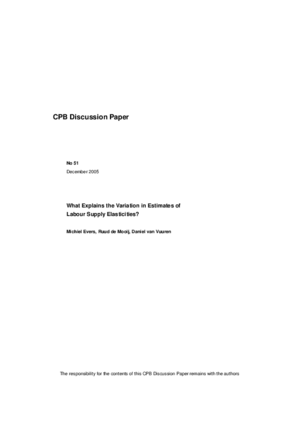December 6, 2005
What explains the variation in estimates of labour supply elasticities?
This paper performs a meta-analysis of empirical estimates of uncompensated labour supply elasticities. We find that much of the variation in elasticities can be explained by the variation in gender, participation rates, and country fixed effects.
Country differences appear to be small though. There is no systematic impact of the model specification or marital status on reported elasticities. The decision to participate is more responsive than is the decision regarding hours worked. Even at the intensive margin, we find that the elasticity for women exceeds that for men. For men and women in the Netherlands, we predict an uncompensated labour supply elasticity of 0.1 (or 0.2 if an alternative specification is preferred) and 0.5, respectively. These values are robust for alternative samples and specifications of the meta regression.
Downloads
Authors
Michiel Evers
Ruud de Mooij
Daniel van Vuuren
